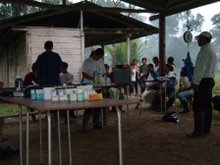In our very last class meeting, Dr Shahi urged us to think about the future of public health. Future directions have been a part of all our discussions in the past few months, but some interesting ideas come out of dedicating an entire class period to the topic.
We’ve talked about PPPs, SMART cards, diffusion of innovation, and community mobilization.
This post is dedicated to another acronym, CCTs: conditional cash transfers. CCTs refer to a government-based program whereby stipends are issued to poor families. It’s not the dole, though—in return for these stipends, families must pledge to immunize and school their kids, and comply with other basic measures designed to stem the vicious cycle of poverty.
Countries like Peru and Brazil (Bolsa Familia) have piloted CCT programs with great success. New York is unveiling a similar scheme, but as a recent NPR segment indicated, the idea has met with some opposition from critics concerned that CCTs are a form of coercion.
My take? I can understand why those suspicious of socialism oppose the idea of CCTs. There are lots of reasons why the program could go horribly wrong. It could be an ethics nightmare. What if no one wants to comply? Does the government deny those families their stipends, leaving them in poverty and without the freedom to choose what is best for their kids?
Peruvian officials deny these concerns, claiming that families are rarely dropped from CCTs, whether they end up complying with the stipulations or not.
But I think the critics are missing the point. There is such a thing as too much democracy. Are we, as a country, really wealthy enough all around to entirely shun socialist ideals? Or is there still a real need for these kinds of programs? As a collective society, I don’t think we’re as modern as we think we are. There’s a lot of room for improvement, and if designed and implemented with public health goals at the forefront, CCTs could really encourage people to access better opportunities for their kids. If we want to see some real changes in the inequalities we keep referring to, we need to get off our democratic high horses and experiment with a little of what appears to be working in other countries—whether you want to call it socialism or common sense.
Read more about CCTs in New York here. And then check out the Peruvian approach. Catch NPR’s coverage of both here.
Subscribe to:
Post Comments (Atom)





No comments:
Post a Comment